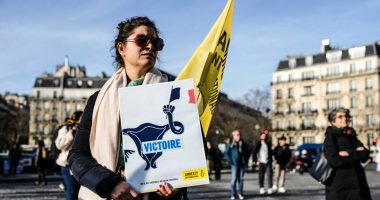WASHINGTON — Facebook announced Wednesday it recently took down separate networks of fake Iranian and Russian accounts attempting to promote pro-regime messages at home and stoke divisions inside targeted countries like Israel, underscoring the persistence of foreign influence campaigns on U.S.-based social media platforms.
One of the Iranian networks used fake accounts to target audiences in Iraq, Afghanistan, Israel and the United Kingdom, posting memes, political cartoons and other content in Arabic, English, Pashto and Hebrew about news and domestic politics, Facebook said.
That network promoted Scottish independence from the U.K., criticism of Israeli Prime Minister Benjamin Netanyahu, and U.S. influence in Iraq and Afghanistan.
“The Taliban and America are united against Afghanistan,” read the caption on one cartoon showing the Taliban and American flags astride a map of the country. “Scotland deserves better,” read another.
The Russian network included 530 fake Instagram accounts originating primarily in Russia and targeting domestic audiences in connection with recent protests in support of Alexei Navalny, an anti-corruption activist and opponent of Russian President Vladimir Putin. As many as 50,000 people followed one or more of the accounts.
The Russian network used techniques known as “hashtag poisoning” and “location poisoning,” posting large volumes of irrelevant or critical content to particular hashtags and location tags to drown out pertinent information and redirect the conversation, Facebook said.
Some of the location tags included places where protesters planned to gather in Moscow and St. Petersburg on Jan. 23 and Jan. 31, and later near Moscow City Court, Facebook said.
For profile pictures, Facebook said, the Russian accounts used celebrity or computer-generated photos, and the accounts appeared to have been created in bulk and purchased from a third-party broker.
The accounts seemed designed to dissuade protesters. One posted in January about the risk of catching the Covid-19 virus.
“Went to the protest on January 23 — now grandfather is on ventilator,” it said.
The fake accounts were quickly detected by Facebook’s automated systems and shut down, Nathaniel Geicher, Facebook’s head of cybersecurity policy, told NBC News.
“They weren’t very effective,” he said, but publicizing them provides useful insights into how foreign propaganda networks function and what messaging they employ.
Facebook didn’t formally attribute the activity to the Iranian and Russian governments.
Source: | This article originally belongs to Nbcnews.com











